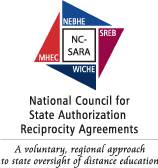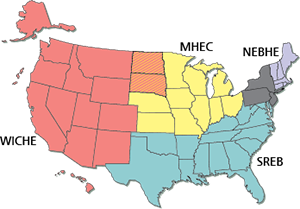Update on SARA - the State Authorization Reciprocity Agreement
Published by: WCET | 12/10/2013
Tags: Regulation, SARA, State Authorization
Published by: WCET | 12/10/2013
Tags: Regulation, SARA, State Authorization
December 9, 2013
We’re pleased to have Marshall Hill, Executive Director of the National Council for State Reciprocity Agreements update us on progress with SARA. WCET will host a free webcast featuring Marshall Hill updating us with more details about SARA on January 23 at 2:00 Eastern/1:00 Central/Noon Mountain/11:00 Pacific.
Russ Poulin
I’m pleased to announce that SARA now has a website – www.nc-sara.org
On our site you’ll find complete information about SARA – history, context, key documents, FAQs, and so forth. I think you’ll find SARA’s Policies and Standards document and the FAQs of particular interest.
We also provide links to the regional education compacts (MHEC, NEBHE, SREB, and WICHE) and their SARA work so that you can keep abreast of SARA developments in your region. We provide contact information for both national and regional SARA staff and a spot where you can request the newsletter we will soon be providing.
Three of the regional compacts have announced SARA forums, where invited teams from the region’s states will assemble to learn how their states can join SARA. The first of those is on Dec. 10 (for the WICHE region), followed on January 10 (for MHEC), and January 21 (for SREB — watch for more information soon). A forum for the NEBHE region has not yet been scheduled.
The FAQs will expand over time. Right now they have the following general topics:

Where helpful, the FAQs refer to the Policies and Standards document. The individual SARA documents adopted by each of the regional compacts were drafted at different times and differ from one another in the degree to which they provide narrative context, a rationale for the need for SARA, and information about the compact itself. The Policies and Standards document eliminates those narratives and distills into one place the actual policies and standards of the initiative. It has been approved by the National Council for SARA.
The regional compacts will very soon begin accepting applications from their states for membership in SARA. Each compact will use the same application form; a generic example is on the website. Similarly, once states are accepted as SARA states, they will use a common form for institutions applying to operate under SARA; that form is on the website, as well.
The next several months will be busy ones, especially for the states and the regional compacts. Most states will need to make statutory changes to enable their participation in SARA. A lot of drafting work has begun in many of them. On our website, we’ll let you know as states and institutions join.
Thanks to our friends at WCET for asking me to contribute this update. They are great partners!
Best wishes and happy holidays.
Marshall Hill
Executive Director
National Council for State Authorization Agreements
mhill@nc-sara.org